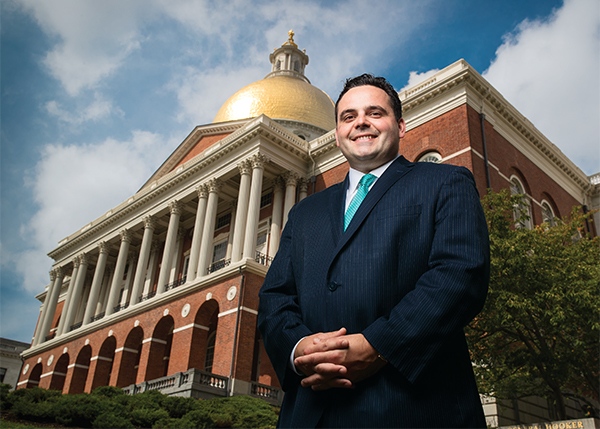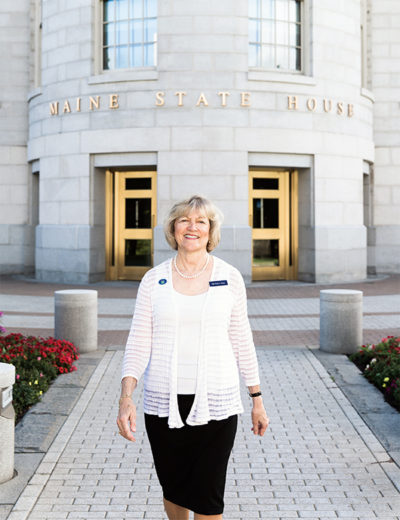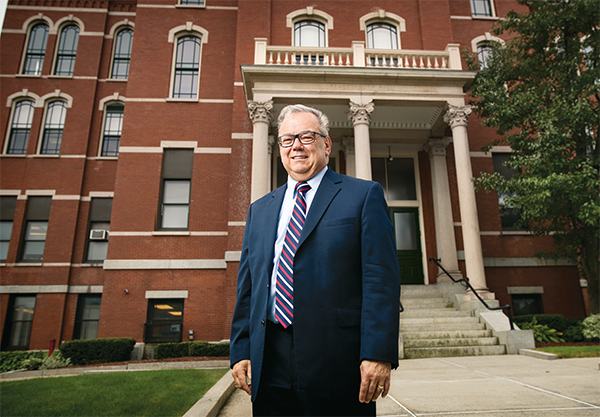
By the time you read this, the bruising, disheartening, never-ending 2016 race for the White House mercifully will have ended (hopefully).
This isn’t a story about that.
Instead, this concerns those unsung community leaders far removed from the noise and division of national politics. Leaders such as Dave Gravel, MBA’84, a city councilor in Peabody, Massachusetts. Gravel first became involved in the electoral process when he was 12 years old, performing the mundane work of dropping off political pamphlets door to door. A brother of Gravel’s sixth-grade teacher, who was a big influence in the boy’s life, was running for city councilor, so Gravel was recruited to help. “At the time, I don’t think I knew what a city councilor did,” he says.
But Gravel asked questions and learned, and every two years, he came back to volunteer for the campaign. In school, Gravel often kept to himself, but going door to door, he felt more outgoing and confident and was able to argue why his candidate was worth someone’s vote. “I felt my contribution was important, that the process was important,” he says. “I got a grounding in civic duty.”
That sense of serving the public good never left him. Before becoming an elected official, Gravel spent nine years working for a government initiative that helped the children of migrant workers receive an education. That work took him across the country, as he set up math and reading programs and talked with migrant parents. He met people working oyster boats in Louisiana and picking peaches in Georgia and blueberries and potatoes in Maine.
Later in life Gravel entered politics, first as a school board member and now a city councilor in his hometown of Peabody, where he has lived since he was 5 years old. He loves the city’s people and its sense of community. “I brought my family up here,” he says. “It’s a great place to live. It’s a place where you feel like you belong.” To be a city councilor requires dealing with meetings and subcommittees, budgets and zoning, taxes and services. It takes time and commitment. But for Gravel, being an elected official means he can serve a city for which he cares deeply. “You have the ability to make your community a better place,” he says.
All Politics Is Local
Being elected to local office, though, doesn’t come with much acclaim. The Babson alumni who hold these positions may work hard, but they often serve in obscurity. All politics may be local, as the saying goes, but many locals don’t pay attention until they are directly affected. Gravel points to a major revitalization project currently going on in downtown Peabody. Planning and discussion about the project have gone on for years, but it’s only now, when construction has caused traffic and some inconvenience, that many people have become aware of it.
The paradox, though, is that local officials can have as big an influence, if not more so, on the day-to-day life of a community than their more well-known counterparts in Washington. “The politicians in Washington are at 10,000 feet,” says Gravel. “We are at the street level.” Just look at zoning ordinances, a common matter dealt with by local governments. Gravel concedes that zoning might not be the most electrifying issue, but zoning decisions can have a profound effect on a town. “You either control or let loose any kind of development you want,” he says. “You can change the whole character of the community.”
Joel Saslaw ’85, who serves with Gravel on the Peabody city council, describes the influence of local officials even more boldly. “I think I can affect people’s lives on a daily basis more than the president of the United States,” Saslaw says. “Helping people is what the job is really about.”
Before becoming a councilor, Saslaw had been involved in Peabody community organizations and youth sports (he has two sons), but he decided to run for council to give more back to the city. Now Peabody’s citizens have a license to bend his ear—and they do. People are not shy about approaching their elected officials, says Saslaw. “Going to the supermarket to pick up bread or milk may not be a five-minute trip,” he says. “That’s the job I ran for.”
People ask for a pothole to be filled, or their street to be plowed, or a tree to be taken down, or a street sign to be put up. “Everybody claims people drive fastest through their neighborhood,” he says. These may not be issues of national importance, but they matter. “People are grateful when a problem is resolved. That’s what makes it worthwhile,” he says. “You’re not moving mountains, but you’re helping people with their quality of life.”
Nick Collins ’08, a Massachusetts state representative from South Boston, knows about the on-call nature of being an elected official. He is seemingly never off-duty. Constituents will even approach his twin brother with issues, mistaking him for their representative. “When you’re at the grocery store or at the ballpark, you’re expected to be on,” Collins says. “I take calls through the evening.” Residents sometimes have trouble with a government agency, or concerns about housing for a senior parent, or an opinion on an upcoming bill. The issues run the gamut, Collins says, but they’re almost always related to something close to home. “Usually it’s what’s right on their doorstep,” he says. “All state politics is pretty personal.”
Before running for office, Collins worked as a regional field director in Pennsylvania for Barack Obama’s 2008 presidential campaign. Then Collins worked in the office of his state senator, helping with a $1 billion stimulus package for the state’s life sciences industry. Collins now represents the area, South Boston, where he grew up. His father also served as a state representative and later worked in the mayor’s and governor’s offices. “In Boston, South Boston in particular, politics is in your blood before you know it,” says Collins. As with any local official, he lives among the people he represents, so he feels an obligation to them. “When you see your constituents all the time, the expectations are you will put politics aside and get things done,” he says.
Hat in the Ring
Collins admits, though, that running for office wasn’t a natural fit for him. “It’s awkward,” he says. “You have to talk about how great you will be. You’re posturing all the time.” Collins first decided to run for state representative in 2010 at the age of 27, which was on the young side, and he had some uneasiness about the pending campaign. Could he raise money and gain support? Could he handle public rejection? His biggest concern was public speaking, which wasn’t a strong suit. He stuttered growing up, and some remnants of the speech disorder still remained. “In order to lead people, you have to move people, and to do that, you have to communicate,” he says. “I thought I could get through it. The only way was to go head first.”

Photo: Tom Kates
State Representative Nick Collins ’08 at the Massachusetts Statehouse in Boston
So Collins jumped into the campaign; any stuttering soon disappeared, and he won. On election night he felt gratitude for everyone who had supported him. “To see those numbers come in, to know you have the confidence of people, it was a humbling and proud moment,” says Collins, who this November ran unopposed for his fourth term.
Peabody’s Saslaw, who is in his second term on the city council, also recalls how moved he was on his first election night. “You’re very emotional,” he says. “That’s all I can say.” Saslaw kept thinking of all the hard work that was needed to win. Every day he had a list of tasks to accomplish, and, every night, he went to bed thinking of the things he could have done. There obviously was fundraising, but he also had to meet with volunteers, place ads, maintain a Facebook page, and deal with lawn signs, whether ordering them, soliciting locations for them, or checking to see if they had disappeared. “All those things add up, and you have to keep an eye on your opponent and what he’s saying and doing about you,” Saslaw says.
His boys (9 and 10 at the time) even helped out by holding up signs at events. They enjoyed the experience, Saslaw says, though they had trouble letting go of some of the claims made about their father in the heat of the campaign. “Children hear everything,” he says.
Phyllis Ginzler, MBA’81, never thought she would run for public office. The state representative from Bridgton, Maine, always followed politics, but she thought of herself as a “backbencher,” someone who supported candidates behind the scenes. In college, the self-described “Goldwater girl” addressed envelopes, made phone calls, and contributed what money she had to Barry Goldwater’s 1964 presidential campaign. “I was young and idealistic,” she says. “I was inspired by him.” His loss taught her a valuable lesson. “It taught me not to sweat the short-term defeats,” she says. “Every young, idealistic generation has to learn that for themselves. They think everything lives and dies in one moment, and it doesn’t.”
Ginzler drifted away from direct involvement in politics as she dedicated herself to her family and a career in the computer industry. Decades passed. Fast forward to 2010 and the passage of the Affordable Care Act. Suddenly, Ginzler was galvanized. “I was very much opposed to that law,” she says. “I changed from being passive to active at that point.” Just as she did with Goldwater, she volunteered for a campaign, and the candidate, who was running for a Congressional seat, made a suggestion. “He was the first person who said to me, ‘You ought to think about running yourself,’” recalls Ginzler. “I laughed. ‘Not me. I’m a backbencher. I do the support here.’”
Then in 2014, no Republican candidate was running for her district’s seat, so she decided to go for it. Not that she knew all the ins and outs of running a political campaign. “But I did know how to do a sales campaign,” Ginzler says. “I drew on everything I learned at Babson and from my sales experience.” She formed a core group of supporters in each of the three towns in her rural district, and they helped organize events for Ginzler and advised her on potential donors.

Photo: Greta Rybus
State Representative Phyllis Ginzler, MBA’81, at the Maine Statehouse in Augusta
Because she was a newcomer, Ginzler knocked on hundreds of doors to introduce herself. “I found that to be the most gratifying part of the campaign,” she says. “For the most part, I got an open-minded reception. Occasionally, I had a Democrat engage me on an issue. But you treat everyone with respect. You acknowledge their position, and you respectfully disagree without being disagreeable.” Ginzler would go on to win that contest, and this November was running for re-election.
Of course, not every campaign ends in victory. Before he served on Peabody’s city council, Gravel was on the school board, where he got into a contentious and unsuccessful fight to build a new high school. The aftermath of that battle followed him the first time he ran for city council. “The opposing side turned me into a tax-and-spend guy,” he says. “It cost me an election.” The hardest part of that defeat was facing his supporters. “I’m in a hall with a bunch of people who are expecting me to win, and I had to tell them I lost,” he says. “You feel like you let them all down. People look at you like they’re attending your wake.”
The best thing to do at that point, says Gravel, is take responsibility and try again. “I find that’s when people respect you the most,” he says. “There is always something you could have done differently. You learn something and move on.” Gravel would go on to eventually win a seat on the council, and he’s now in his fifth term.
The People’s House
Winning an election, however, doesn’t translate into automatic trust from the voters. People are suspicious of politicians, Gravel says, even on a local level. They wonder about motives, about what elected officials have to gain. “There is a skepticism people have,” he says. “The way you change that is your actions. People get to know you over time.”
In matters before him, Gravel tries his best to be fair. This isn’t always easy. “You get friends and even family who will call you and say, ‘Can you do this and can you do that?’ ” he says. “What I can do is listen to your side, and listen to their side, and make the most balanced and fair decision I can make.” Those decisions can be unpopular. When he served on the school board, he supported using eminent domain to take a farm property for an elementary school the district needed to build. “I had people who I considered really good friends, and they were very upset about us taking the land,” he says. “You have people you see at the soccer field looking at you like you’re a piece of dirt.”
Gravel tries to turn down the heat on contentious issues. “I don’t believe in mudslinging,” he says. “I am old school. I believe in the power of debate. If I want to convince people, I need to do my homework, understand the issues, and make my argument.”

Photo: Tom Kates
City Councilor Dave Gravel, MBA’84, at the City Hall in Peabody, Massachusetts
Listening, debating, and focusing on the issues can seem like a quaint idea, considering the fractured state of Washington. As a Massachusetts state representative, Collins works in Boston’s grand Statehouse, its golden dome gleaming in the sun. “It’s the people’s house,” he says, and inside, he and his colleagues, despite their differences, try to do the people’s work. The process often isn’t pretty, but Collins is gratified by what he has accomplished. “You always need to build consensus. We may be a majority of Democrats, but there are factions within that,” he says. “If your colleagues see you as blind to ideology with no room for compromise, you shut the door on yourself to get things done.”
Over in the Maine Statehouse in Augusta, Ginzler is proud of the way the state’s legislators handle themselves. “I would say there is a strong air of civility in the chambers,” she says. “We agree to disagree. It never gets personal.” The toughest fight she experienced was last year’s budget vote, which went into the wee hours. “It was a battle royale,” she says, “but we fought it on the issues.”
When he thinks about the country’s often harsh and fragmented political discourse, Gravel comes back to the skepticism that voters have for politicians. To be a local official already is challenging enough. It takes a significant commitment, and the pay is typically small or even nonexistent. Add in that skepticism, fed by Washington’s discord, and he worries that good people will be scared away from running for local office. “If everyone decides they don’t want to get involved, what do we have?” Gravel says. “Nothing.”
People who care about their community, Gravel says, should become involved. A government is only as good as the people who lead it. “If you have great people run for office, you have great government,” he says. “If you have positive people run, you have a positive government.”
